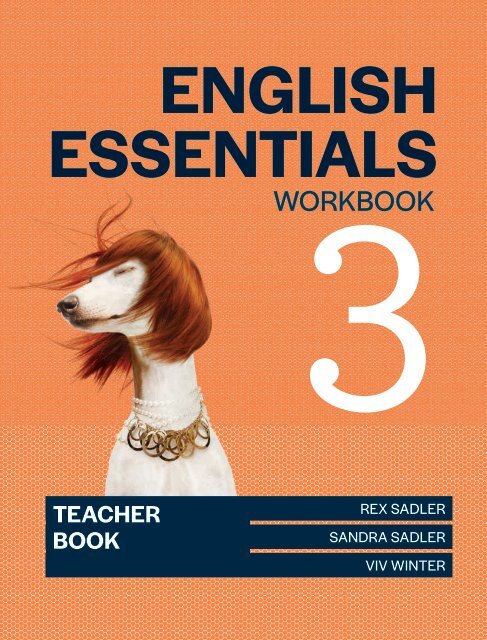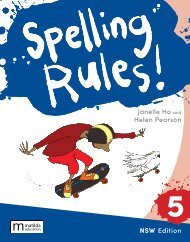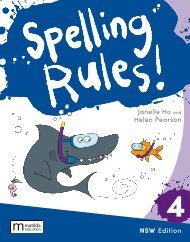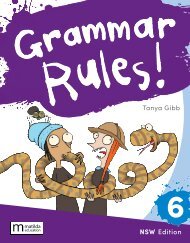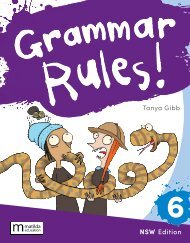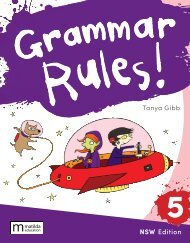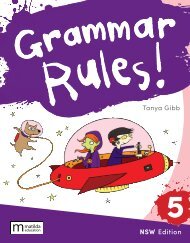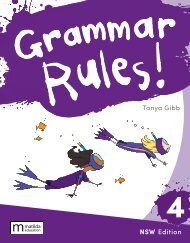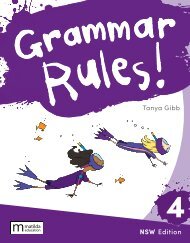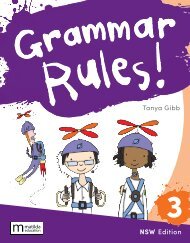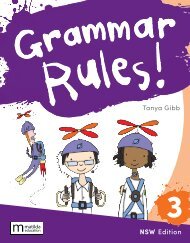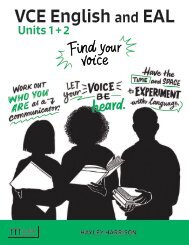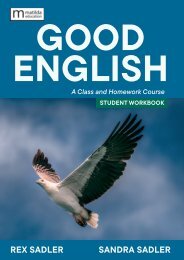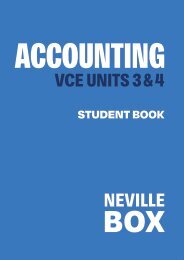English Essentials Teacher Book 3 sample
English Essentials Workbook 3 accommodates a wide range of student abilities and is suitable for both classwork and homework. The units in each section are short and self-contained, making them highly accessible and offering teachers maximum flexibility. The grammar and language units provide clear explanations of rules and conventions with carefully sequenced exercises. The texts selected for comprehension are rich and varied, while the writing tasks provide guidelines, models and photographs to help inspire students to develop their writing skills. This Teacher Book provides answers to all the comprehension, language, spelling and vocabulary questions in the student workbook.
English Essentials Workbook 3 accommodates a wide range of student abilities and is suitable for both classwork and homework. The units in each section are short and self-contained, making them highly accessible and offering teachers maximum flexibility. The grammar and language units provide clear explanations of rules and conventions with carefully sequenced exercises. The texts selected for comprehension are rich and varied, while the writing tasks provide guidelines, models and photographs to help inspire students to develop their writing skills.
This Teacher Book provides answers to all the comprehension, language, spelling and vocabulary questions in the student workbook.
Create successful ePaper yourself
Turn your PDF publications into a flip-book with our unique Google optimized e-Paper software.
ENGLISH<br />
ESSENTIALS<br />
WORKBOOK<br />
TEACHER<br />
BOOK<br />
REX SADLER<br />
SANDRA SADLER<br />
VIV WINTER
ENGLISH<br />
ESSENTIALS<br />
WORKBOOK<br />
TEACHER<br />
BOOK<br />
REX SADLER<br />
SANDRA SADLER<br />
VIV WINTER
<strong>English</strong> <strong>Essentials</strong> Workbook 3 <strong>Teacher</strong> <strong>Book</strong><br />
1st edition<br />
Rex Sadler<br />
Sandra Sadler<br />
Viv Winter<br />
This edition published in 2021 by<br />
Matilda Education Australia, an imprint<br />
of Meanwhile Education Pty Ltd<br />
Level 1/274 Brunswick St<br />
Fitzroy, Victoria Australia 3065<br />
T: 1300 277 235<br />
E: customersupport@matildaed.com.au<br />
www.matildaeducation.com.au<br />
Publisher: Olive McRae<br />
Project editors: Caitlin Martin-Flower and Amy Nicholls-Diver<br />
Copy editor: Ronél Redman<br />
Proofreader: Sarah Blood<br />
Design manager: Jo Groud<br />
Cover designer: Anna Cosma<br />
Text designer: Anna Cosma<br />
Production controller: Nicole Ackland<br />
Permissions researcher: Hannah Tatton<br />
Typeset in PMN Caecilia 55 Roman 10pt on 16pt<br />
by Newgen KnowledgeWorks Pvt. Ltd., Chennai, India<br />
Cover image: Lee Towndrow/Getty Images<br />
First edition published in 2019 by Macmillan Science and<br />
Education Australia Pty Ltd<br />
Copyright © Rex Sadler, Sandra Sadler and Viv Winter 2019<br />
The moral rights of the authors have been asserted.<br />
All rights reserved.<br />
Except under the conditions described in the Copyright Act<br />
1968 of Australia (the Act) and subsequent amendments,<br />
no part of this publication may be reproduced, stored in<br />
a retrieval system, or transmitted in any form or by any<br />
means, electronic, mechanical, photocopying, recording<br />
or otherwise, without the prior written permission of the<br />
copyright owner.<br />
Educational institutions copying any part of this book for<br />
educational purposes under the Act must be covered by<br />
a Copyright Agency Limited (CAL) licence for educational<br />
institutions and must have given a remuneration notice<br />
to CAL.<br />
Licence restrictions must be adhered to. For details of the<br />
CAL licence contact:<br />
Copyright Agency Limited, Level 11, 66 Goulburn Street,<br />
Sydney, NSW 2000.<br />
Telephone: (02) 9394 7600.<br />
Email: memberservices@copyright.com.au<br />
Publication data<br />
Author: Rex Sadler, Sandra Sadler, Viv Winter<br />
Title: <strong>English</strong> <strong>Essentials</strong> Workbook 3 <strong>Teacher</strong> <strong>Book</strong><br />
ISBN: 9781420246230<br />
A catalogue record for this<br />
book is available from the<br />
National Library of Australia<br />
Internet addresses<br />
At the time of printing, the internet addresses appearing<br />
in this book were correct. Owing to the dynamic nature of<br />
the internet, however, we cannot guarantee that all these<br />
addresses will remain correct.<br />
Warning: It is recommended that Aboriginal and Torres<br />
Strait Islander peoples exercise caution when viewing this<br />
publication as it may contain names or images of deceased<br />
persons.<br />
Printed in by <br />
1 2 3 4 5 6 7 25 24 23 22 21 20
CONTENTS<br />
Preface ....................................................................................................................................................................................................................................................................................................................................................................... vii<br />
Acknowledgements ................................................................................................................................................................................................................................................................................................................... viii<br />
PART 1 Language 1<br />
UNIT 1 Nouns .................................................................................................................................................................................................................................................... 2<br />
UNIT 2 Adjectives .................................................................................................................................................................................................................................... 4<br />
UNIT 3 Verbs ....................................................................................................................................................................................................................................................... 6<br />
UNIT 4 Adverbs ............................................................................................................................................................................................................................................ 8<br />
UNIT 5 Using better words ............................................................................................................................................................................................ 10<br />
UNIT 6 Clauses ......................................................................................................................................................................................................................................... 14<br />
UNIT 7 Pronouns .................................................................................................................................................................................................................................. 18<br />
UNIT 8 Prepositions ....................................................................................................................................................................................................................... 20<br />
UNIT 9 Prefixes ......................................................................................................................................................................................................................................... 22<br />
UNIT 10 Suffixes ......................................................................................................................................................................................................................................... 24<br />
UNIT 11 Shades of meaning ........................................................................................................................................................................................... 26<br />
UNIT 12 Varying your sentences ............................................................................................................................................................................ 28<br />
UNIT 13 Similes ............................................................................................................................................................................................................................................ 30<br />
UNIT 14 Metaphors ............................................................................................................................................................................................................................. 31<br />
UNIT 15 Personification ............................................................................................................................................................................................................. 32<br />
UNIT 16 Hyperbole ............................................................................................................................................................................................................................... 33<br />
UNIT 17 Alliteration and assonance ............................................................................................................................................................... 34<br />
UNIT 18 Onomatopoeia ............................................................................................................................................................................................................. 35<br />
UNIT 19 Allusions ..................................................................................................................................................................................................................................... 36<br />
UNIT 20 Puns and oxymorons .................................................................................................................................................................................... 37<br />
UNIT 21 Euphemisms ..................................................................................................................................................................................................................... 38<br />
UNIT 22 Symbols ...................................................................................................................................................................................................................................... 39<br />
UNIT 23 Tone ...................................................................................................................................................................................................................................................... 40<br />
UNIT 24 Persuasive language ...................................................................................................................................................................................... 42<br />
UNIT 25 Rhetorical questions ....................................................................................................................................................................................... 44<br />
UNIT 26 Repetition ................................................................................................................................................................................................................................ 46<br />
UNIT 27 Denotation and connotation ......................................................................................................................................................... 48<br />
UNIT 28 Emotive language ................................................................................................................................................................................................. 50<br />
iii
UNIT 29 Fact and opinion ..................................................................................................................................................................................................... 52<br />
UNIT 30 Opinion and issues ............................................................................................................................................................................................ 54<br />
UNIT 31 Opinion and evidence ................................................................................................................................................................................. 56<br />
UNIT 32 Setting out dialogue ........................................................................................................................................................................................ 58<br />
PART 2 Spelling & Vocabulary 59<br />
UNIT 1 Describing people ................................................................................................................................................................................................ 60<br />
UNIT 2 Confusing couples .............................................................................................................................................................................................. 61<br />
UNIT 3 Active words ..................................................................................................................................................................................................................... 62<br />
UNIT 4 The newspaper ........................................................................................................................................................................................................... 63<br />
UNIT 5 Saving the environment .......................................................................................................................................................................... 64<br />
UNIT 6 Law and order ............................................................................................................................................................................................................... 65<br />
UNIT 7 Let’s go to the movies ................................................................................................................................................................................ 66<br />
UNIT 8 Who am I? ............................................................................................................................................................................................................................. 67<br />
UNIT 9 Struggle for survival ......................................................................................................................................................................................... 68<br />
UNIT 10 On the stage ..................................................................................................................................................................................................................... 69<br />
UNIT 11 Difficult doubles ........................................................................................................................................................................................................ 70<br />
UNIT 12 All kinds of people ............................................................................................................................................................................................... 71<br />
UNIT 13 Word skills – ‘ary’ ................................................................................................................................................................................................... 72<br />
UNIT 14 Word skills – ‘ade’ ................................................................................................................................................................................................ 73<br />
UNIT 15 Freedom of speech ........................................................................................................................................................................................... 74<br />
UNIT 16 Espionage .............................................................................................................................................................................................................................. 75<br />
UNIT 17 Happy days ......................................................................................................................................................................................................................... 76<br />
UNIT 18 Borrowed words ...................................................................................................................................................................................................... 77<br />
UNIT 19 Computers ............................................................................................................................................................................................................................ 78<br />
UNIT 20 Overcoming adversity ................................................................................................................................................................................. 79<br />
UNIT 21 Word skills – ‘au’ ..................................................................................................................................................................................................... 80<br />
UNIT 22 Word skills – ‘ent’ .................................................................................................................................................................................................. 81<br />
UNIT 23 The power of poetry ........................................................................................................................................................................................ 82<br />
UNIT 24 Perplexing pairs ........................................................................................................................................................................................................ 83<br />
UNIT 25 Our country ......................................................................................................................................................................................................................... 84<br />
UNIT 26 Word skills – ‘ph’ ..................................................................................................................................................................................................... 85<br />
iv<br />
Contents
UNIT 27 Getting a job ..................................................................................................................................................................................................................... 86<br />
UNIT 28 Attitudes and feelings .................................................................................................................................................................................. 87<br />
UNIT 29 Increase your word power 1 ......................................................................................................................................................... 88<br />
UNIT 30 Increase your word power 2 ......................................................................................................................................................... 89<br />
UNIT 31 Fun with words ........................................................................................................................................................................................................... 90<br />
PART 3 Literature 91<br />
UNIT 1 Overcoming adversity ................................................................................................................................................................................. 92<br />
UNIT 2 Teenagers at war .................................................................................................................................................................................................... 94<br />
UNIT 3 Fantasy ......................................................................................................................................................................................................................................... 96<br />
UNIT 4 Laughing matters ................................................................................................................................................................................................... 98<br />
UNIT 5 Film poster ....................................................................................................................................................................................................................... 100<br />
UNIT 6 This is Africa ................................................................................................................................................................................................................. 102<br />
UNIT 7 Pirates of the high seas ...................................................................................................................................................................... 104<br />
UNIT 8 Suspense ............................................................................................................................................................................................................................ 106<br />
UNIT 9 Science fiction ......................................................................................................................................................................................................... 108<br />
UNIT 10 Poets paint word pictures ............................................................................................................................................................. 110<br />
UNIT 11 The wonderful world of whales ......................................................................................................................................... 112<br />
UNIT 12 Adventure ........................................................................................................................................................................................................................... 114<br />
UNIT 13 It’s only a game ..................................................................................................................................................................................................... 116<br />
UNIT 14 Survivor diaries and letters ......................................................................................................................................................... 118<br />
UNIT 15 In my opinion .............................................................................................................................................................................................................. 120<br />
UNIT 16 Being different ......................................................................................................................................................................................................... 122<br />
UNIT 17 Ships of the desert ........................................................................................................................................................................................ 124<br />
UNIT 18 Analysing a photograph .................................................................................................................................................................... 126<br />
UNIT 19 Malala’s speech ................................................................................................................................................................................................... 128<br />
UNIT 20 Such is life ........................................................................................................................................................................................................................ 130<br />
UNIT 21 The poetry of war ............................................................................................................................................................................................. 132<br />
UNIT 22 Autobiography ......................................................................................................................................................................................................... 134<br />
UNIT 23 Chocolate ........................................................................................................................................................................................................................... 136<br />
UNIT 24 Fascinating word origins .................................................................................................................................................................. 138<br />
UNIT 25 New Year’s Eve cartoon ..................................................................................................................................................................... 140<br />
Contents<br />
v
PART 4 Writing 141<br />
UNIT 1 A day in the life of a famous person ...................................................................................................................... 142<br />
UNIT 2 An unforgettable experience ................................................................................................................................................... 143<br />
UNIT 3 The school I’d like ........................................................................................................................................................................................... 144<br />
UNIT 4 Villains ........................................................................................................................................................................................................................................ 145<br />
UNIT 5 One day in the future ................................................................................................................................................................................ 146<br />
UNIT 6 A twist in the tale ............................................................................................................................................................................................... 147<br />
UNIT 7 Opposing viewpoints ............................................................................................................................................................................... 148<br />
UNIT 8 Favourite cartoon character ..................................................................................................................................................... 149<br />
UNIT 9 Fictional heroes .................................................................................................................................................................................................... 150<br />
UNIT 10 A tour itinerary ......................................................................................................................................................................................................... 151<br />
UNIT 11 Horror stories ............................................................................................................................................................................................................. 152<br />
UNIT 12 Scripting a scene .............................................................................................................................................................................................. 153<br />
UNIT 13 A book that inspired me .................................................................................................................................................................... 154<br />
UNIT 14 Events that changed the world ......................................................................................................................................... 155<br />
UNIT 15 Your say ................................................................................................................................................................................................................................. 156<br />
UNIT 16 Biography ........................................................................................................................................................................................................................... 157<br />
UNIT 17 Journeys ............................................................................................................................................................................................................................... 158<br />
UNIT 18 Using sound words ...................................................................................................................................................................................... 159<br />
UNIT 19 Stream of consciousness .............................................................................................................................................................. 160<br />
UNIT 20 Writing short stories ................................................................................................................................................................................... 161<br />
vi<br />
Contents
PREFACE<br />
Our primary purpose in writing this workbook is to develop essential <strong>English</strong> skills. However, we also aim<br />
to motivate students to engage with the way our language works and to build confidence in their own<br />
ability to communicate effectively.<br />
<strong>English</strong> <strong>Essentials</strong> Workbook 3 is divided into four key sections for maximum accessibility and flexibility:<br />
• Part 1: Language<br />
• Part 2: Spelling & Vocabulary<br />
• Part 3: Literature<br />
• Part 4: Writing<br />
The Language section is designed to extend students’ understanding and control of language. The basics<br />
of grammar and punctuation are presented in a relevant and meaningful sequence so that students gain<br />
confidence as they improve their language skills.<br />
The Spelling & Vocabulary section will enable students to improve their basic literacy skills. All the list<br />
words have been chosen because of their relevance to real-life experiences. Students will often encounter<br />
these words and will need to be familiar with both the spelling and meaning. A good number have been<br />
specially chosen to help students expand their vocabulary.<br />
The Literature section aims to develop comprehension skills through a wide range of high-interest<br />
literary, personal and everyday texts. These include stories, poems, newspaper articles, information<br />
reports, cartoons, speeches and posters, as well as extracts from novels, autobiographies and non-fiction.<br />
The Writing section has been created to enable students to become better writers. Each writing<br />
topic examines a different writing skill, genre or technique. Writing styles such as narrative, descriptive,<br />
persuasive, informative and personal are featured. The use of writing models and photographs helps target<br />
and improve specific writing skills.<br />
A separate <strong>Teacher</strong> <strong>Book</strong> provides answers to all the comprehension, language, spelling and<br />
vocabulary questions in the student workbook. It has been designed as a tool for assessing student<br />
progress.<br />
Rex Sadler, Sandra Sadler and Viv Winter<br />
vii
ACKNOWLEDGEMENTS<br />
The author and publisher are grateful to the following for permission to reproduce copyright material:<br />
PHOTOGRAPHS<br />
Alamy/©Paramount Pictures/Courtesy Everett Collection, 94, /20th Century Fox/A.F. Archive, 108, /AF<br />
archive/Warner Bros, 122, /Collection Christophel © Disney Enterprises /DR, 11, /Disney/A.F. Archive,<br />
104, /GL archive, 130, /New Line Cinema/All Star Picture Library, 96, /North Wind Picture Archives, 4, /<br />
Pictorial Press Ltd, 149, /PictureLux / The Hollywood Archive, 101, 150, /RGR Collection, 116, /Ysanne<br />
Slide, 145; AP Photo/Andy Wong, 126; Getty/Andrew Burton, 128, /Robert Cianflone, 134, /Ronald<br />
Dumont / Stringer, 157, /EyeWire, 65, /NurPhoto, 142, /Sam Tabone, 92, /VisualCommunications, 143;<br />
iStock/4x6, 148, /Akabel, 133, /akova, 57, /AleksandarNakic, 59, /amfroey, 145, /andrewburgess, 51, /<br />
AnnaPustynnikova, 136, /Antagain, 31, /borchee, 158, /borchee, 40, /BrianAJackson, 98, /Byronsdad,<br />
30, /chictype, 63, /Choreograph, 120, /CHUYN, 68, /cinoby, 52, /CraigRJD, 49, /Deagreez, 28, /Steve<br />
Debenport, 144, /destillat, 85, /dja65, 80, /dottedhippo, 12, /FangXiaNuo, 87, /FORGEM, 25, /Geerati, 152,<br />
/German-skydiver, 141, /Matt_Gibson, 132, /GlobalP, 64, 102, 138, 161, /halbergman, 70, /HannahWade,<br />
42, /izusek, 160, /Jakgree, 119, /jenifoto, 73, /jgroup, 66, /Juanmonino, 88, /legna69, 77, /LeoPatrizi, 114,<br />
/lisegagne, 3, /Ljupco, 69, 82, /lukbar, 23, /Lysogor, 6, /m-imagephotography, 86, /Massonstock, 75, /<br />
master1305, 13, /michaeljung, 83, /monkeybusinessimages, 76, /mustafagull, 8, /Neustockimages, 67, /<br />
Pablo_K, 1, /PhonlamaiPhoto, 146, /Photokanok, 124, /photopsist, 106, /prapassong, 2, /Ranta Images,<br />
45, /ratpack223, 21, /rbv, 62, /schlol, 58, /Loic Seigland, 81, /Sportstock, 91, /spxChrome, 34, 110, /<br />
spyarm, 32, /subjug, 39, /t_kimura, 155, /Urilux, 15, /Maartje van Caspel, 147, /xxz114, 89, /yanik88, 60, /<br />
YinYang, 16, /zentilla, 78, /Stephanie_Zieber, 26; Shutterstock/AlekseyKarpenko, 46, /East, 18, /fboudrias,<br />
153, /Jeanne Provost, 159, /Boris Stroujko, 151, /Keith Michael Taylor, 125, /Paul S. Wolf, 112.<br />
OTHER MATERIAL<br />
Extract from, ‘Down with sourpuss Aussies who hate Halloween’ by Frank Leggett, The Age, 30 October<br />
2018. The use of this work has been licensed by Copyright Agency except as permitted by the Copyright<br />
Act, you must not re-use this work without the permission of the copyright owner or Copyright Agency,<br />
120–21; Extract from The Happiest Refugee by Anh Do, Allen and Unwin, Australia, 2010, 98–9; Extract<br />
from Lionheart by Jesse Martin, Allen and Unwin, Sydney, 2001, 134–35; Extract from Holes by Louis<br />
Sacher, © Louis Sacher, 1998, Bloomsbury Publishing Plc, 106–7; Extract from The Maze Runner by<br />
James Dashner, text © James Dashner, 2010. Reproduced with permission of Chicken House Ltd. All<br />
rights reserved, 108–9; Extract from Malala Yousafzai’s speech to the UN Youth Assembly on 12 July<br />
2013. Reproduced with permission of Curtis Brown Group Ltd on behalf of Malala Yousafzai. Copyright<br />
© Malala Yousafzai, 2013, 128–29; Extract from Working Class Boy by Jimmy Barnes, HarperCollins<br />
Publishers, 2016, 92–3; Poem ‘Lady Feeding the Cats’ by Douglas Stewart, from Selected Poems,<br />
HarperCollins Publishers, 1973, 110; Extract from The Hobbit or There and Back Again © J.R.R<br />
Tolkien,1937. Reprinted by permission of HarperCollins Publishers Ltd, 96–7; Cartoon ‘news year eve’<br />
viii
y Mark Knight, Herald Sun, 140; Extract from The Witches by Roald Dahl, © Roald Dahl Story Company<br />
Ltd, 1983, Jonathan Cape Ltd and Penguin <strong>Book</strong>s Ltd, 145; Extract from Hatchet by Gary Paulsen © Gary<br />
Paulsen, 1987, Published by Macmillan Children’s <strong>Book</strong>s, London, UK, 114–15; Extract from The Elephant<br />
Whisperer: Learning About Life, Loyalty and Freedom From a Remarkable Herd of Elephants by Lawrence<br />
Anthony with Graham Spence, Pan Macmillan 2017. Copyright © Lawrence Anthony and Graham Spence<br />
2009. Reproduced with permission of the Licensor through PLSclear, 102–3; Extract from The Diary of<br />
Lena Mukhina: A Girl’s Life in the Siege of Leningrad by Lena Mukhina, Pan Macmillan, 2015.Copyright ©<br />
Central National Archives for Hisorical-Political Documents St Petersburg 2012, Editions Robert Laffont<br />
Paris, 2013. <strong>English</strong> translation © Amanda Love Darragh, 2012. Reproduced with permission of the<br />
Licensor through PLSclear, 118; Extract from Tomorrow When The War Began by John Marsden, reprinted<br />
with permission of Pan Macmillan Australia Pty Ltd. Copyright © John Marsden 1993, 94–5; Extract from<br />
Deadly, Unna? by Phillip Gwynne. Copyright © Phillip Gwynne, 1998. First published by Penguin <strong>Book</strong>s.<br />
Reprinted by permission of Penguin Random House Australia Pty Ltd, 116–17; Extract from The Outsiders<br />
by S E Hinton, Puffin Modern Classics, 2003, Great Britain, p12–14. Text copyright © S. E. Hinton, 1967.<br />
Introduction copyright © Julia Eccleshare, 2003. Reproduced by permission of Penguin <strong>Book</strong>s Ltd, 122–3;<br />
Cover of The <strong>Book</strong> Thief by Markus Zusak, illustrated by Trudy White. Published by Black Swan. Reprinted<br />
by permission of The Random House Group Ltd.© 2013, 154; Poem ‘Bushfire’ by Allison Reldas, 30;<br />
Extract from Black Snake: The Daring of Ned Kelly. Reproduced by permission of Walker <strong>Book</strong>s Australia<br />
Pty Ltd © 2002 Carole Wilkinson, 130–31; Cartoon reproduced with permission of Cathy Wilcox, 55.<br />
While every care has been taken to trace and acknowledge copyright, the publisher tenders their apologies<br />
for any accidental infringement where copyright has proved untraceable. They would be pleased to come<br />
to a suitable arrangement with the rightful owner in each case.<br />
ix
PART 1<br />
LANGUAGE
Unit 1<br />
Nouns<br />
Nouns are naming words. There are four main kinds of nouns: common,<br />
proper, collective and abstract nouns. Most nouns are common nouns.<br />
• A common noun is a word that names a person, animal, place or thing.<br />
It does not begin with a capital letter unless it begins a sentence.<br />
student zebra computer river boy kitchen<br />
• A proper noun is the name of a specific person, place or thing.<br />
Proper nouns can be identified easily because they always start<br />
with a capital letter.<br />
Darwin Honda Rebecca October Italy<br />
• A collective noun is used to name a collection or group of similar<br />
people, animals or things.<br />
a gaggle of geese a herd of elephants a litter of kittens<br />
• An abstract noun names qualities, feelings, ideas or actions.<br />
beauty friendship liberty sadness warmth chaos<br />
Identifying common nouns<br />
Use the definitions and first-letter clues to identify the common nouns.<br />
1 a person who writes for newspapers and magazines j<br />
2 a person who studies rocks and earth formations g<br />
3 a very large African animal once called a ‘river horse’ h<br />
4 the official residence of an ambassador e<br />
5 a person who travels in search of new lands, etc. e<br />
6 a wild, dog-like African animal that makes a noise similar to<br />
a laugh or a scream<br />
h<br />
7 a person who has been shipwrecked c<br />
8 a piece of land where a lot of fruit trees are grown o<br />
9 a person whose job it is to ride horses in races j<br />
10 soldiers trained to fight on foot i<br />
11 a dense forest in a tropical country j<br />
12 a boat with two parallel hulls c<br />
13 waterlogged land, a bog or marsh s<br />
14 a tall tower used to store grain s<br />
15 a cruel, unjust and unkind ruler t<br />
16 a special seat used by a king or queen on special occasions t<br />
17 a person who has great love for their country p<br />
journalist<br />
geologist<br />
hippopotamus<br />
embassy<br />
explorer<br />
hyena<br />
castaway<br />
orchard<br />
jockey<br />
infantry<br />
jungle<br />
catamaran<br />
swamp<br />
silo<br />
tyrant<br />
throne<br />
patriot<br />
2 ENGLISH ESSENTIALS Workbook 3
Identifying proper nouns<br />
Find two proper nouns in the list that go with each common noun below.<br />
Vegemite<br />
Medusa<br />
Volvo<br />
Superman<br />
Ganges<br />
Sprite<br />
Andes<br />
Amazon<br />
Dracula<br />
Cairo<br />
London<br />
Juliet<br />
Volkswagen<br />
Alps<br />
Romeo<br />
Wonder Woman<br />
LANGUAGE<br />
1 heroes:<br />
2 monsters:<br />
3 cars:<br />
4 mountains:<br />
5 lovers:<br />
6 products:<br />
7 cities:<br />
8 rivers:<br />
Superman<br />
Dracula<br />
Volkswagen<br />
Alps<br />
Romeo<br />
Sprite<br />
Cairo<br />
Ganges<br />
Wonder Woman<br />
Medusa<br />
Volvo<br />
Andes<br />
Juliet<br />
Vegemite<br />
London<br />
Amazon<br />
Completing the noun collections<br />
Choose the appropriate people, animals or things from the brackets to complete the sentences.<br />
1 In the barn there were a litter of kittens<br />
, a brood of chickens<br />
and<br />
a sheaf of corn<br />
. (chickens, corn, kittens)<br />
2 A squad of police<br />
ran up the flight of stairs<br />
to arrest the gang<br />
of thieves<br />
. (stairs, thieves, police)<br />
3 A bunch of grapes<br />
, an album of photos<br />
and a cluster<br />
of diamonds<br />
lay on the millionaire’s desk. (photos, grapes, diamonds)<br />
4 The board of directors<br />
agreed to purchase a new fleet of cars<br />
and<br />
a gallery of paintings . (paintings, directors, cars)<br />
Forming abstract nouns<br />
Change each of the following words into abstract nouns. For example:<br />
true—truth curious—curiosity fertile—fertility<br />
1 enjoy<br />
2 certain<br />
3 private<br />
4 anxious<br />
5 accurate<br />
6 peculiar<br />
enjoyment<br />
certainty<br />
privacy<br />
anxiety<br />
accuracy<br />
peculiarity<br />
7 desperate<br />
8 scarce<br />
9 mobile<br />
10 honest<br />
11 severe<br />
12 clean<br />
desperation<br />
scarcity<br />
mobility<br />
honesty<br />
severity<br />
cleanliness<br />
Part 1 LANGUAGE 3
Unit 2<br />
Adjectives<br />
Adjectives help to provide insights about the world around us. They convey shape, size, strength,<br />
colour or any other attribute that describes a noun or pronoun. As the following examples show,<br />
writers often use adjectives to make their characters memorable and their writing come alive for<br />
their readers.<br />
Miss Barkley<br />
Miss Barkley was quite tall. She wore what seemed to be a nurse’s uniform, was blonde<br />
and had a tawny skin and grey eyes. I thought she was very beautiful.<br />
from A Farewell to Arms by Ernest Hemingway<br />
Huck’s father<br />
His hair was long and tangled and greasy and hung down, and you could see his eyes<br />
shining through like he was behind vines. It was all black, no grey; so was his long,<br />
mixed-up whiskers.<br />
from Huckleberry Finn by Mark Twain<br />
Identifying adjectives<br />
Read the description and identify all the adjectives. Hint: There are thirteen adjectives, and a few are<br />
hyphenated.<br />
My sister and her husband Joe<br />
My sister was not a good-looking woman. She was<br />
tall and bony, with black hair and piercing eyes, and<br />
almost always wore a coarse apron. Joe was a fair man<br />
with curls of flaxen hair on each side of his smooth face.<br />
He was a mild, good-natured, easy-going fellow.<br />
adapted from Great Expectations by Charles Dickens<br />
good-looking, tall, bony, black, piercing, coarse,<br />
fair, flaxen, each, smooth, mild, good-natured,<br />
easy-going<br />
4 ENGLISH ESSENTIALS Workbook 3
Adjectives describing characters<br />
Find two adjectives in the list that are similar in meaning to each group of adjectives below.<br />
polite<br />
glad<br />
fraudulent<br />
ecstatic<br />
sorrowful<br />
pretty<br />
frightened<br />
handsome<br />
horrified<br />
intelligent<br />
scheming<br />
annoyed<br />
friendly<br />
irritated<br />
despondent<br />
hilarious<br />
courageous<br />
humorous<br />
fearless<br />
ingenious<br />
LANGUAGE<br />
1 happy, cheerful, jubilant<br />
2 scared, afraid, terrified<br />
3 angry, irate, vexed<br />
4 brave, valiant, plucky<br />
5 sad, unhappy, miserable<br />
6 clever, smart, astute<br />
7 funny, amusing, comical<br />
8 pleasant, agreeable, genial<br />
9 beautiful, attractive, lovely<br />
10 dishonest, deceitful, devious<br />
glad<br />
frightened<br />
annoyed<br />
courageous<br />
despondent<br />
intelligent<br />
humorous<br />
friendly<br />
handsome<br />
fraudulent<br />
ecstatic<br />
horrified<br />
irritated<br />
fearless<br />
sorrowful<br />
ingenious<br />
hilarious<br />
polite<br />
pretty<br />
scheming<br />
Comparative or superlative?<br />
Adjectives have three degrees of comparison:<br />
• Positive (one person or thing)<br />
• Comparative (comparing two)<br />
• Superlative (comparing more than two)<br />
tall<br />
taller<br />
tallest<br />
Amy is tall.<br />
Amy is taller than Jessica.<br />
Amy is the tallest girl in the class.<br />
Complete each sentence by inserting either the correct comparative or superlative form of the adjective in<br />
brackets.<br />
1 Of the three sisters, Chloe is the youngest<br />
. (young)<br />
2 That was the best<br />
pizza I had ever tasted. (good)<br />
3 David is lazier<br />
than Jed. (lazy)<br />
4 Japanese is more difficult<br />
to learn than French. (difficult)<br />
5 In the southern hemisphere it is hotter<br />
in January than in June. (hot)<br />
6 It was the easiest<br />
exam I had ever done. (easy)<br />
7 She is the most conscientious<br />
student in the class. (conscientious)<br />
8 The Pacific Ocean is deeper<br />
than the Arctic Ocean. (deep)<br />
9 He played the worst<br />
game of tennis of his career. (bad)<br />
10 Sarah is the happiest<br />
person I know.<br />
Part 1 LANGUAGE 5
Unit 3<br />
Verbs<br />
Verbs are action words that express doing, having and being.<br />
Sometimes a verb consists of one word only, but at other times it<br />
may consist of a group of words. For example:<br />
She walks. He is running. They have been camping.<br />
Verbs in action<br />
The verbs in the following passage have been removed and are listed below.<br />
Your task is to restore the verbs to complete the graphic<br />
description of the vehemence of an avalanche.<br />
had collapsed<br />
was rushing<br />
were running<br />
were toppling<br />
were engulfed<br />
was startled<br />
had swept<br />
blotted<br />
was<br />
The avalanche<br />
An hour later I was startled by a tremendous roar. An enormous<br />
portion of the ice wall had collapsed . Huge masses of ice as high as<br />
cathedrals were toppling to destruction; billowing clouds of snow spray<br />
had swept<br />
upwards and outwards in front of a monstrous avalanche.<br />
On the slope below was<br />
the party, mere black dots. They<br />
were running<br />
, but how slowly, how uselessly, before the reeling clouds of<br />
death. The next moment the avalanche was rushing<br />
down upon them; they<br />
were engulfed and blotted<br />
out like insects beneath a tidal wave.<br />
from The Kangchenjunga Adventure by Frank Smythe<br />
Matching verbs and nouns<br />
Certain verbs are often used with particular nouns. Choose verbs from the list to complete the following<br />
phrases.<br />
inherit<br />
solve<br />
narrate<br />
quench<br />
writhe<br />
survive<br />
exonerate<br />
navigate<br />
recuperate<br />
forecast<br />
celebrate<br />
formulate<br />
correct<br />
apply<br />
intervene<br />
extinguish<br />
6 ENGLISH ESSENTIALS Workbook 3
1 to quench<br />
one’s thirst<br />
2 to correct<br />
an error<br />
3 to recuperate<br />
after an illness<br />
4 to navigate<br />
a ship<br />
5 to survive<br />
an ordeal<br />
6 to forecast<br />
the weather<br />
7 to exonerate<br />
from blame<br />
8 to extinguish<br />
a fire<br />
9 to formulate<br />
a plan<br />
10 to celebrate<br />
a birthday<br />
11 to apply<br />
for a job<br />
12 to solve<br />
a problem<br />
13 to narrate<br />
a story<br />
14 to writhe<br />
in agony<br />
15 to intervene<br />
in a dispute<br />
16 to inherit<br />
a fortune<br />
LANGUAGE<br />
Identifying synonyms and antonyms<br />
• A synonym is a word that is similar in meaning to another word. Attempt is a synonym for try.<br />
• An antonym is a word that is opposite in meaning to another word. Stop is an antonym of start.<br />
Place the synonyms and antonyms from the ‘Choices’ column in the appropriate column for each verb.<br />
Verb Synonym Antonym Choices<br />
1 diminish lessen<br />
increase<br />
increase, lessen<br />
2 deteriorate worsen<br />
improve<br />
worsen, improve<br />
3 hurry hasten<br />
linger<br />
hasten, linger<br />
4 conclude finish<br />
begin<br />
finish, begin<br />
5 purchase buy<br />
sell<br />
sell, buy<br />
6 build construct<br />
demolish<br />
demolish, construct<br />
7 shorten abbreviate<br />
lengthen<br />
abbreviate, lengthen<br />
8 excavate dig<br />
fill<br />
dig, fill<br />
9 remember recollect<br />
forget<br />
forget, recollect<br />
10 shut close<br />
open<br />
close, open<br />
11 retreat withdraw<br />
advance<br />
withdraw, advance<br />
12 waste squander<br />
conserve<br />
conserve, squander<br />
13 leave depart<br />
return<br />
return, depart<br />
14 permit allow<br />
forbid<br />
forbid, allow<br />
15 help aid<br />
hinder<br />
hinder, aid<br />
16 conceal hide<br />
reveal<br />
reveal, hide<br />
17 unite join<br />
separate<br />
join, separate<br />
18 refuse reject<br />
accept<br />
reject, accept<br />
Part 1 LANGUAGE 7
Unit 4<br />
Adverbs<br />
As their name suggests, adverbs add meaning to verbs. However, adverbs may also add meaning<br />
to adjectives and other adverbs.<br />
He spoke angrily.<br />
The adverb angrily modifies the verb spoke.<br />
I am very happy.<br />
The adverb very modifies the adjective happy.<br />
You are talking too softly. The adverb too modifies the adverb softly.<br />
Adverbs tell how, when, where or to what extent the action of the verb takes place. Very often they end<br />
in ‘-ly’. The following examples give you some idea of the types of adverb you might encounter.<br />
• Many adverbs tell how the action happens.<br />
silently angrily fast politely rudely<br />
• Some adverbs tell when the action happens.<br />
today later previously now usually<br />
• Other adverbs tell where something happens.<br />
here outside near everywhere<br />
• Adverbs may also tell how much or to what extent.<br />
completely ruined quite often very slowly extremely clever<br />
Identifying adverbs<br />
Identify the adverbs in each sentence below.<br />
1 Suddenly, frantically, the pilot struggled with the controls of the diving helicopter.<br />
suddenly, frantically<br />
2 The frogs are extremely noisy now that it is raining heavily.<br />
extremely, now, heavily<br />
3 Driving on the highway today we nearly hit a kangaroo.<br />
today, nearly<br />
4 The goods train was often travelling very slowly.<br />
often, very, slowly<br />
5 They unexpectedly perceived a flock of birds flying south.<br />
unexpectedly, south<br />
6 They were then financially secure.<br />
then, financially<br />
7 The hikers drank thirstily and wearily from the mountain stream.<br />
thirstily, wearily<br />
8 The fans cheered wildly as our captain nimbly kicked the winning goal.<br />
wildly, nimbly<br />
9 The baby was sleeping safely upstairs during the flash flood yesterday.<br />
safely, upstairs, yesterday<br />
8 ENGLISH ESSENTIALS Workbook 3
Changing phrases into adverbs<br />
Change the phrases in italics into adverbs. The first one is done as an example.<br />
1 She played tennis with skill.<br />
skilfully<br />
2 The soldier fought with defiance.<br />
defiantly<br />
3 The swimmer won with ease.<br />
easily<br />
4 The soprano sang with melody.<br />
melodiously<br />
5 He arrived on time.<br />
punctually<br />
6 They searched in every possible place. everywhere<br />
7 The student replied with indignation. indignantly<br />
8 There will be an audit once a year.<br />
yearly/annually<br />
9 The class was working without any noise. noiselessly/silently<br />
10 He worked hard at all times.<br />
always<br />
11 Help will come in the near future.<br />
soon<br />
12 He drew the map with accuracy.<br />
accurately<br />
13 She listened to her patient with sympathy. sympathetically<br />
14 He banged on the door with anger.<br />
angrily<br />
15 The winner raised his arm in triumph. triumphantly<br />
16 The army proceeded with caution.<br />
cautiously<br />
17 The taxi driver waited without patience. impatiently<br />
18 The student spoke without respect.<br />
disrespectfully<br />
LANGUAGE<br />
Using adverbs with speech<br />
As with nouns, verbs and adjectives, it is important to use suitable adverbs, especially in combination with<br />
words like said, yelled, exclaimed, etc. when writing dialogue. Complete the sentences by choosing the<br />
most suitable adverb from the ones in brackets.<br />
1 ‘I’m by far the best player,’ he exclaimed proudly<br />
. (efficiently, proudly, patiently)<br />
2 ‘I’m leaving you for good,’ Angela said emphatically . (safely, emphatically, rarely)<br />
3 ‘Let’s get out of here before it explodes,’ said Tim fearfully<br />
. (fearfully, slowly, sadly)<br />
4 ‘Hands up!’ yelled the robber aggressively . (lazily, jealously, aggressively)<br />
5 ‘You’re going to be in trouble,’ Amy said spitefully<br />
. (spitefully, clumsily, easily)<br />
6 ‘I’ll help you when you need me,’ Dad said supportively . (hugely, keenly, supportively)<br />
7 ‘Please go now,’ she cried tearfully<br />
. (tearfully, badly, carefully)<br />
8 ‘You must watch out for sharks,’ the guide said warningly<br />
. (politely, warningly, exactly)<br />
Part 1 LANGUAGE 9
Unit 5<br />
Using better words<br />
Using better nouns<br />
As well as naming people, places, things and qualities, well-chosen nouns give the audience<br />
additional specific information. The following examples show how this can be achieved.<br />
The car braked. The hatchback braked. (The kind of vehicle is revealed.)<br />
The dog is barking. The dachshund is barking. (The breed of dog is given.)<br />
He grabbed a tool. He grabbed a hammer. (The kind of tool is specified.)<br />
Choosing more specific nouns<br />
Replace each noun in italics with a more specific noun from the list. Use each noun once only.<br />
ballerina<br />
novel<br />
duke<br />
yacht<br />
brawl<br />
eagle<br />
inferno<br />
safari<br />
limousine<br />
backpack<br />
beret<br />
pony<br />
revelry<br />
mansion<br />
whimper<br />
panorama<br />
banquet<br />
troupe<br />
emergency<br />
bouquet<br />
1 At the party there was a fight brawl<br />
between two of the guests.<br />
2 The business executive was driven in a black car limousine<br />
.<br />
3 The film star’s multi-level house mansion<br />
was advertised for sale.<br />
4 A towering fire inferno<br />
engulfed the hotel.<br />
5 The boat yacht<br />
skimmed over the waves.<br />
6 There was an unexpected traffic problem emergency<br />
on the highway.<br />
7 The young horse pony<br />
galloped around the paddock.<br />
8 There was a magnificent view panorama<br />
of the hills surrounding the lake.<br />
9 The tourists went on a trip safari<br />
to view elephants and lions.<br />
10 The book novel<br />
Watership Down is the story of a group of rabbits.<br />
11 The famous nobleman duke<br />
was wearing diamond cufflinks.<br />
12 The hiker was carrying a heavy bag backpack<br />
.<br />
13 The woman was wearing a woollen hat beret<br />
.<br />
14 The accomplished dancer ballerina<br />
pirouetted exquisitely.<br />
15 The bird eagle<br />
was soaring high in the sky.<br />
16 A wonderful meal banquet<br />
was served in the dining room.<br />
17 A group troupe<br />
of dancers entered the theatre.<br />
18 We could hear the sounds of celebration revelry<br />
in the street below.<br />
19 The sick child’s cry whimper<br />
woke his parents.<br />
20 The speaker was presented with a bunch bouquet<br />
of flowers.<br />
10 ENGLISH ESSENTIALS Workbook 3
Using better adjectives<br />
Carefully chosen adjectives enable us to see people, objects and<br />
experiences in new ways. Consider the following examples<br />
where a stronger adjective is more effective and gives an extra<br />
dimension to the noun it describes.<br />
a bad queen a sinister queen<br />
a good novel an engrossing novel<br />
a hidden passage a secret passage<br />
a large boulder a massive boulder<br />
LANGUAGE<br />
Identifying stronger adjectives<br />
Replace each adjective in italics with a stronger one from the list.<br />
Use each adjective once only. The first letter is given to help you.<br />
vigilant<br />
ancient<br />
obnoxious<br />
amiable<br />
contemporary<br />
gloomy<br />
avaricious<br />
exemplary<br />
zealous<br />
charismatic<br />
lacerated<br />
scrumptious<br />
parched<br />
prudent<br />
exquisite<br />
meandering<br />
1 The dry p parched<br />
land was drought stricken.<br />
2 The explorer came upon old a ancient<br />
Egyptian ruins.<br />
3 The student was eating a tasty s scrumptious apple pie.<br />
4 The politician is a popular c charismatic<br />
member of parliament.<br />
5 He was asked to leave the restaurant because of his bad o obnoxious<br />
behaviour.<br />
6 She was suffering from a badly torn l lacerated<br />
arm.<br />
7 The new manager is a very friendly a amiable<br />
team leader.<br />
8 The retired school principal was an excellent e exemplary<br />
educator.<br />
9 It was a rare and beautiful e exquisite<br />
sculpture.<br />
10 The greedy a avaricious<br />
lawyer charges excessive fees.<br />
11 The coach made a very wise p prudent<br />
decision.<br />
12 In the distance, we could see the dark g gloomy<br />
walls of the castle.<br />
13 She is a keen z zealous<br />
supporter of education for all the world’s children.<br />
14 The students enjoyed viewing the modern c contemporary paintings.<br />
15 The driver had to stay watchful v vigilant<br />
for animals on the road.<br />
16 The winding m meandering stream made its way slowly through the hills.<br />
Part 1 LANGUAGE 11


